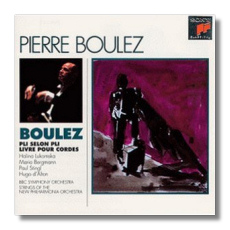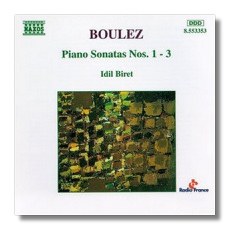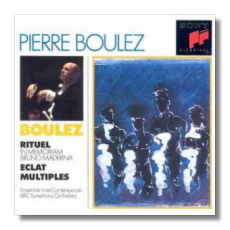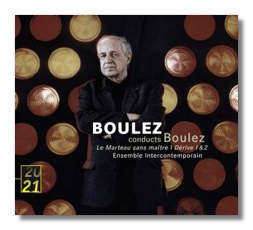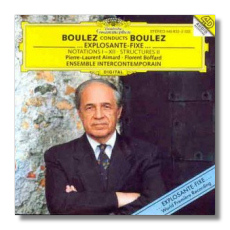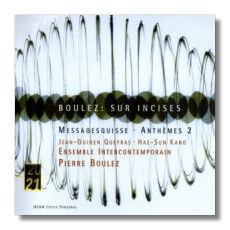
The Internet's Premier Classical Music Source
Related Links
-
Find CDs & Downloads
Amazon - UK - Germany - Canada - France - Japan
ArkivMusic - CD Universe
Find DVDs & Blu-ray
Amazon - UK - Germany - Canada - France - Japan
ArkivMusic-Video Universe
Find Scores & Sheet Music
Sheet Music Plus -
Recommended Links
Site News
Pierre Boulez
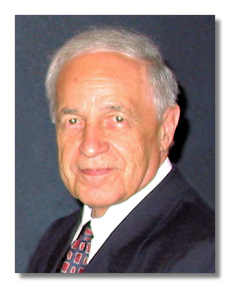
(b. 1925)
Pierre Boulez (b. March 26, 1925, Montbrison France) is not only the most renowned French composer of his generation, but also a brilliant conductor and pianist, teacher, author of articles and books about new music and probably the strictest critic of traditional music business.
After having studied mathematics and music in Lyon, he moved to Paris in 1942, where he studied with composer and organist Olivier Messiaen (harmony, 1945/46) at the Paris Conservatoire, with René Leibowitz (12-tone technique, 1946/47) and Andrée Vaurabourg (counterpoint). In 1954, then music director (since 1946) of the Marigny (a theater founded by Jean-Louis Barrault), he founded the Concerts Marigny. This series of avantgarde concerts, later called Domaine Musical, took place in Paris and were revolutionary in content and presentation.
At this time Boulez had already begun experimenting with serialism. He applied this technique, in which not only the 12 tones but also the pitches, durations and dynamics are systematically structured, in works like Structures I for two pianos (1951) and Le marteau sans maître (The Hammer without A Master, after three poems by René Char, 1952-54/57). With the latter, which was first performed at the IGNM World Music Days in 1955, he won international recognition as a composer.
In Le marteau sans maître, which deals with the relationship between music and words, had used a further developed, less strict form of serialism – and had started looking for other methods of composition, declaring that serialism had died of academism. (In 1995 he explained that "one made use of time, but no music was produced out of it.") New concepts – also using aleatory music – led to the composition of Pli selon pli (1960), Piano Sonata No. 3, Eclat/Multiples for 25 instruments (1965/70) and Figures, Doubles, Prismes for orchestra (1957/63); in Poesie pour Pouvoir for three orchestras and tape after Henri Michaux (1958) and Rituel for eight orchestral groups (1974/75) he created a flexible, stereophonic sound concept. After researches at the IRCAM (Institut de Recherche et de Coordination Acoustic/Music) he composed Répons for solo instruments, instrumental ensemble and live electronics (1980/84) and …explosante-fixe… for flutes and ensemble (1993), which also involves electro-acoustic realization. In recent years he has revised and reorchestrated earlier works (e.g. Notations and Répons).
"Rien n'est plus important pour moi que la creation." (Nothing is more important for me than creation.) Boulez once said, but it is likely that he not only talked about composing new music. His way of conducting is both, creative and precise, and conducting is nearly as important as composing for him. After having led Domaine Musical concerts, his international career started at a concert with the Südwestfunk Orchestra in Baden-Baden (Germany) in 1958. In the sequel he became principal guest conductor of the Cleveland Orchestra (1967) and principal conductor of the BBC Symphony Orchestra (1971-74) and the New York Philharmonic (1971-1978). In 1995 he was named principal guest conductor of the Chicago Symphony Orchestra and – to celebrate his 70th birthday – undertook a worldwide tour including concerts with several orchestras, ensembles and world-famous soloists.
Many of his recordings – for CBS (Sony), Erato and nowadays exclusively for Deutsche Grammophon – have been honored: With the Ensemble InterContemporain he won the Prix Caecilia 1994, the Gramophone Award 1995 and the Edison Award 1995, the recording of Belá Bartók's The Wooden Prince and Cantana Profana with the Chicago Symphony Orchestra was awarded the U.S. Grammy Award four times. In 1995 Pierre Boulez was awarded the Preis der deutschen Schallplattenkritik (Germany) and named Artist of the Year by Gramophone Magazine.
Beside composing, conducting, teaching (a.o. at the Darmstädter Ferienkurse, Germany, and in 1963 at Harvard University) and writing Pierre Boulez has always been concerned with the nonartistic circumstances of writing and performing music. He often had sharp words for the traditional music business, but also seized opportunities to change it. In the sixties Boulez declared, that the operahouses were "full of dust and shit", called the then minister of cultural affairs, novelist André Malraux, a "babbler and weakling", and the exponents of contemporary opera business "twice lacquered hairdressers, who pay homage to an entirely superficial modernism". In 1974 he nevertheless accepted French President Georges Pompidou's invitation to found and direct a musical research center, the IRCAM, which first was established inside the Centre Pompidou, later in a partly subterranean building vis a vis planned by Italian architect Renzo Piano. Today the IRCAM, which has the status of an academy, is one of the most important and noted new music research institutes in the world. Being its homebase, the IRCAM is also closely associated with the Ensemble InterContemporain, which was founded by Boulez in 1976 and is – beside the Ensemble Modern Frankfurt (Germany) and the Klangforum Wien (Austria) – one of the best European Ensembles for the performance of contemporary music. Although Boulez resigned his directorship of the IRCAM in 1991, he is still president of the Ensemble InterContemporain.
The second "Grand Project" he took part in was the Cité de la musique in Parisian district La Villette. The city of music, planned by Christian de Portzamparc, contains a.o. rehearsal rooms for the Ensemble InterContemporain and a concerthall with 1200 seats. This concerthall was created for the performance of some compositions, Pierre Boulez had shown to the architect: Carré for four orchestras and choirs and Gruppen (Groups) for three orchestras by Karlheinz Stockhausen, Allelujah by Luciano Berio and Rituel and Répons by Boulez himself. In January 1995 Boulez was the first to test the quality of this concerthall. He led the opening concert of the Cité de la musique, conducting works of Mahler, Rameau and Strawinsky. ~Esther Pirchner
Recommended Recordings
Pli selon pli
- Pli selon pli for Soprano & Orchestra; Music for Strings/Sony Classical "Pierre Boulez Edition" SK68335
-
Halina Lukomska (soprano), Pierre Boulez/BBC Symphony Orchestra, Strings of the New Philharmonia Orchestra
- Pli selon pli/Deutsche Grammophon "20/21" 471344-2
-
Christine Schäfer (soprano), Pierre Boulez/Ensemble InterContemporain
- Pli selon pli; Figures, Doubles, Prismes, Le Visage nuptial/Apex 2564-62083-2
-
Phyllis Bryn-Julson (soprano), Pierre Boulez/BBC Symphony Orchestra
Piano Sonatas
- Piano Sonatas #1-3/Naxos 8.553353
-
Idil Biret (piano)
- Piano Sonatas #1-3/Deutsche Grammophon "20/21" 477532-8
-
Paavali Jumppanen (piano)
- Piano Sonatas #1-3/Wergo WER60121-50
-
Herbert Henck (piano)
 Memoriale a Bruno Maderna
Memoriale a Bruno Maderna
- Memoriale a Bruno Maderna (Ritual for Orchestra); Eclat, Multiples/Sony SMK45839
-
Pierre Boulez/BBC Symphony Orchestra
- Memoriale a Bruno Maderna (Ritual for Orchestra); Messagesquisse, Notations I-IV/Erato 2292-45493-2
-
Daniel Barenboim/Orchestre de Paris
Le marteau sans maître
- Le marteau sans maître; Dérive 1 & 2 /Deutsche Grammophon "20/21" 477532-7
-
Pierre Boulez/Ensemble InterContemporain
- Le marteau sans maître (excerpts) "Leaving Home: Orchestral Music in the 20th Century, Vol. 6 - After the Wake" with Strauss, Schoenberg, Britten, Stravinsky & Stockhausen/Arthaus Musik DVD 102043
-
Simon Rattle/City of Birmingham Symphony Orchestra
…explosante-fixe…
- …explosante-fixe…; Notations I-XII, Structures Book 2/Deutsche Grammophon 445833-2
-
Pierre-André Valade (flute), Sophie Cherrier (MIDI flute), Emmanuelle Ophèle (flute), Pierre Boulez/Ensemble Intercontemporain
Sur Incises
- Sur Incises; Messagesquisse, Anthemes 2/Deutsche Grammophon "20/21" 463475-2
-
Pierre Boulez/Ensemble InterContemporain Members, Paris Cello Ensemble














